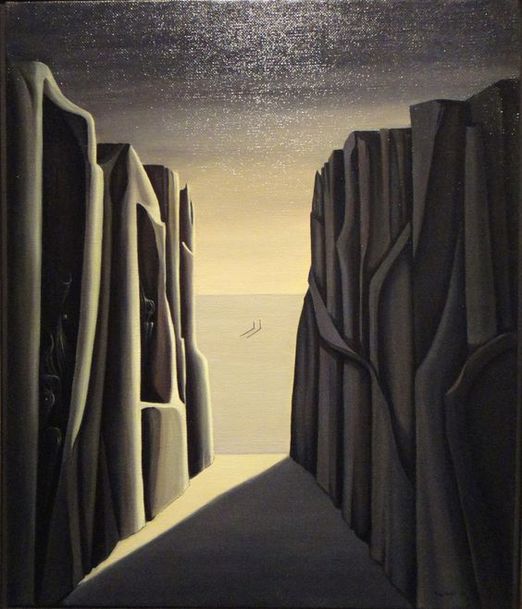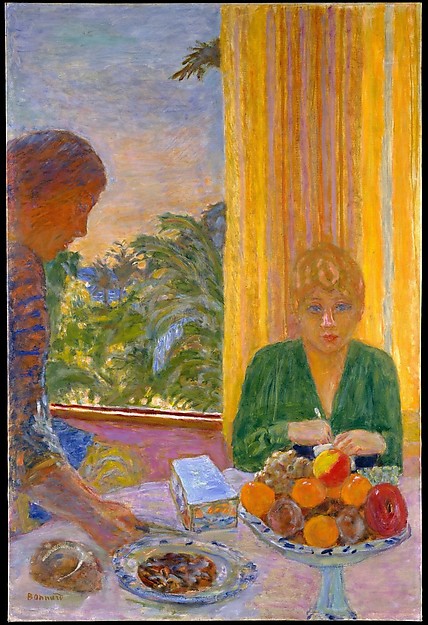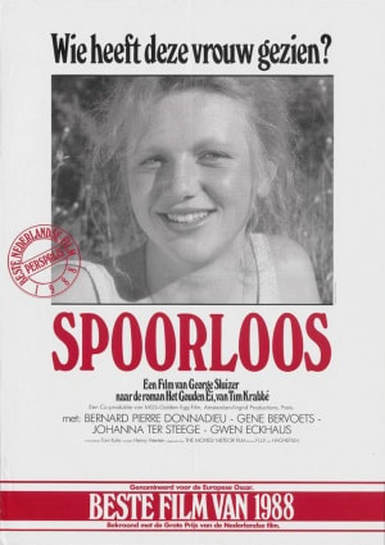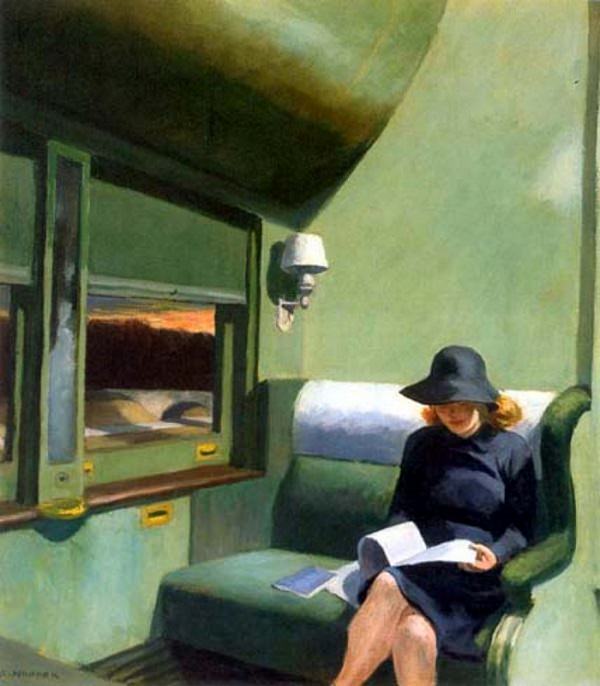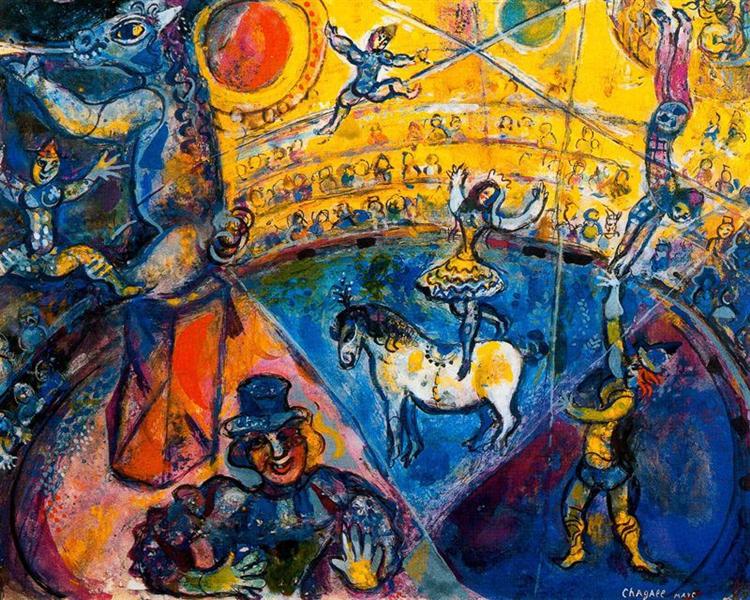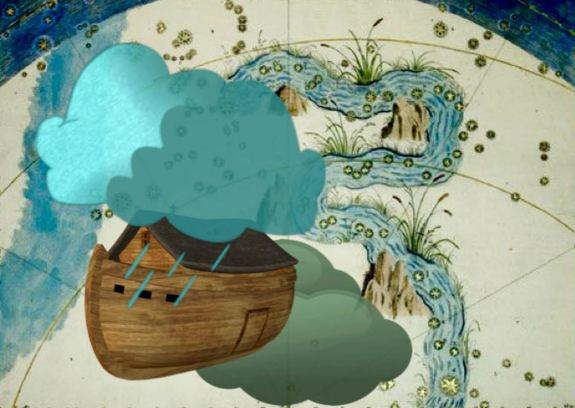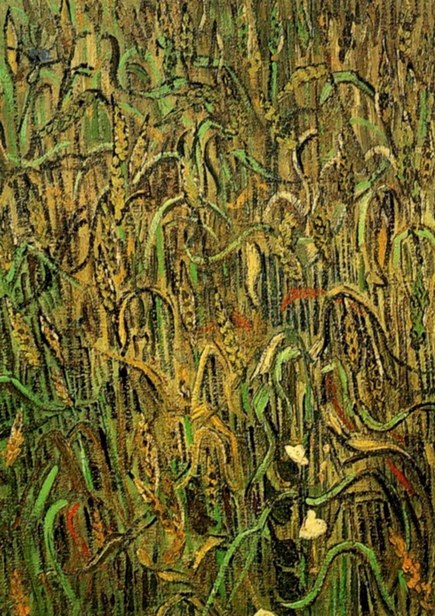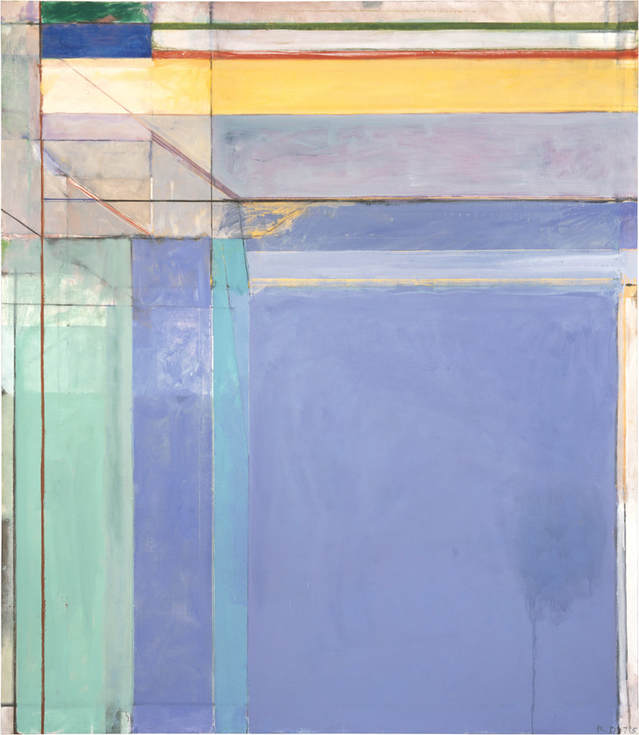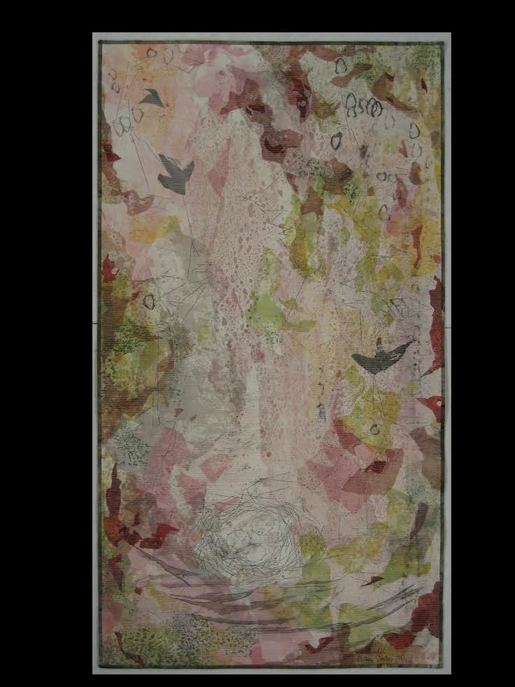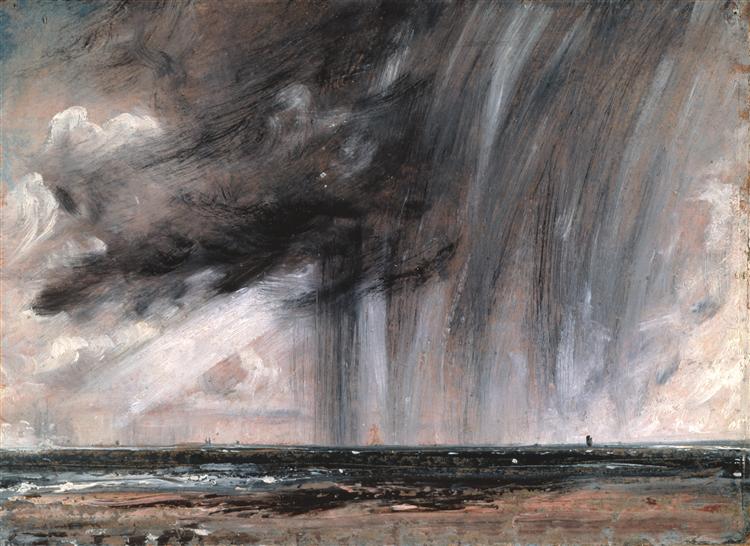|
I Have No Shadow she says she has no shadow but she is a shaman of shadows she paints two stone cliffs the rift you can barely see a couple in the middle distance some confined existence i want to know what substance creates a shadow with hidden stairs that leads to doors a shallow shell a darkness that might open to others her paintings will have questions for you some type of scaffolding surreal & somewhat sinister what we may find or not & read or not between the lines think that her final act is planned we won’t see it coming the future two bullets shot through the canvas : Watching the Clock Sharon Tracey Sharon Tracey is a writer, editor and author of What I Remember Most Is Everything (ALL CAPS PUBLISHING, 2017), her first full-length collection of poetry. Her poems have appeared in Naugatuck River Review, Silkworm, The Skinny Poetry Journal and are forthcoming in Common Ground Review and Ekphrasis. Art and nature are recurring themes in her work. She has enjoyed a varied career as an environmentalist, policy analyst, editor and communications director. She is currently working on a series of poems featuring women artists of the past five centuries.
0 Comments
The Green Blouse, 1919 In this interior, a girl with a blouse the colour of summer sits in front of a window. Behind her, a curtain falls, a shower of light, and behind that, the tropical foliage of Le Cannet. Outside my window in Virginia, it’s a day still trying to make up its mind—dregs of snow in the corners, daffodils ringing bravely in the cold wind. Spring is late this year, the grass undecided if it should take a pass, stay sleeping, rolled up in its patchy old coat. But there are two blue jays at the feeding table, and they aren’t fooled by the bare trees, the blossoms reluctant to unfold. They know the sun by its angle, see that the stars have gathered in their spring flocks. They are bluer than the sky, and they know it. Every day, there’s another cup of sunlight. They tilt back their heads, and they drink it all in. Barbara Crooker This poem first appeared in Barbara Crooker's book, Les Fauves. A previous contributor to The Ekphrastic Review, Barbara Crooker's work has appeared in a variety of literary journals and anthologies, including Common Wealth: Contemporary Poets on Pennsylvania and The Bedford Introduction to Literature. She is the author of eight books of poetry; Les Fauves is the most recent. She has received a number of awards, including the WB Yeats Society of New York Award, the Thomas Merton Poetry of the Sacred Award, and three Pennsylvania Council on the Arts Creative Writing Fellowships. Her website iswww.barbaracrooker.com A Child Again viewing the Dutch film The Vanishing I lean forward to meet the flame at centre frame engulfed in darkness. My eyes adjust. A red silken backdrop falls forward. The heroine’s elbows fan out against the casket that hems her in. My feet press the floor. Her trembling makes the spark waver then go out. Will she catch a whiff of chloroform beneath her quivering upper lip? Again she flicks her lighter, its flame held close enough to scorch the fabric of fear. Her low groan makes me shudder. The camera cuts to the fresh-turned ground she lies beneath. From moving upright to buried alive. I can’t breathe! My own elbows measure left, right. I’m twelve again, reading burial tales under thick covers by flickering flashlight. Her tremble risks setting silk on fire. Be still. Don’t waste oxygen. Wait. Margo Davis Margo’s poems have appeared in Light: A Journal of Photography & Poetry, Wisconsin Review, Midwest Quarterly, Slipstream, Agave Magazine, A Clean, Well-Lighted Place. Forthcoming poems are to appear in Misfit Magazine, Civilized Beasts, Vine Leaves Literary, Burgers and Barrooms Anthology, and Echoes Off a Canyon Wall, an ekphrastic photo / poetry exhibit. Compartment C, Car 193 (1938) "Rock-poster artists such as Rick Griffin, Alton Kelley, Victor Moscoso, Stanley Mouse, and Wes Wilson generated an exciting array of distinctive works featuring distorted hand-lettering and vibrating colours . . ." de Young Museum, “The Summer of Love Experience” A green compartment of varied shades. She reads the script, takes little notice of the space. Midnight blue, her dress matches her hat. The brim swoops over her face concealing her eyes, but no one needs to see her eyes, they are on the page. She is alone, solitude the muse for now. Where is she going? The sun sets in the rectangular window; darkened hills, an arched bridge over its own small river. White snow on the side, white as the page she reads. The play will never be produced. Maybe she will choose the script still on the seat beside her. The script of her parallel life. He might have painted her as a dancer doing a striptease across the stage, breasts flung forward, nipples red as cherries ready to be picked. Or a woman staring at her polished fingernails, red too, in an all-night diner where the cook and the man she just met talk eternal baseball. They will never know who wins. On a closer look they are not scripts she reads but pamphlets by Swiss chemist Dr Albert Hofmann. Seeking a blood stimulant, he is the first to synthesize LSD. She has a rare disease slowing her circulation. This made her parents overly protective; despite her stylish air, she is painfully shy. She will never try LSD, dying before it becomes widely distributed but her daughter will. Her daughter will be an artist in San Francisco who uses psychedelic designs to promote rock shows at the Fillmore. Men will dominate the market, but her daughter will possess a strong drive and a flare for colour no one else can match. Here in Compartment C a man is about to enter. He will use a line from a movie to engage her. When she looks at him she thinks of Errol Flynn in Robin Hood and is smitten. The pamphlet falls from her hands. The shade on the window is lowered. The canvas goes slack, all the muted tones become intense, and intertwine. Virginia Barrett Virginia Barrett’s work has most recently appeared, or is forthcoming in The Writer’s Chronicle, Narrative, Poetry of Resistance (University of Arizona Press), New Mexico Review, and Forage. She received a 2017 writer’s residency grant from the Helene Wurlitzer Foundation of Taos, NM. Her chapbook, Stars By Any Other Name, was a semi-finalist for the Frost Place Chapbook Competition sponsored by Bull City Press, 2017. She holds an MFA in Writing from the University of San Francisco and a MAT in Art from Rhode Island School of Design. Under the Big Top
In the bed of the ’46 pickup The family huddles like penguins For the short distance To the Greatest Show on Earth. My face shows Entertainment a stranger in our world. Already I smell the popcorn, the sawdust; I feel the rush, Imagining lights and music and flawless feats. We enter The colourful menagerie. The big top Revealing first the freak And then the fat lady, And clowns cutting capers, shooting confetti, And exotic blankets adorning elephants, Whose headdresses and sequined girls dazzle the crowd gone wild. And the gymnasts with poles displaying Versatility and balance. We inhale and hold - Confined in cages just moments ago, lions now jump through fiery rings As trainer in ruffled shirt and white, stained gloves lifts his baton. On the drop, Horses thunder past, and stunt men, practiced and controlled, somersault Higher, Higher, On each other’s shoulders. Hang tight! Trapeze artists Soar, Spin, Dive, Defying the odds. No safety net. And unicyclists, Perched three high, Hands outstretched, Circle, One, two, three. The greatest show on earth, Well-defined and executed, Tastes of death. There’s something- Something primitive about it – I mean, the ring and all. Jo Taylor Jo has been an English teacher for over thirty years, and poetry has always been her favorite genre to teach. In recent years, her students' success with publishing has motivated her to relinquish her writing, and the experience has been rewarding. She is one of nine children born and raised by tenant farmers in Middle Georgia, and much of her poetry reflects that family heritage. Dream-Sailing Inspired by Acts 10 The high noon sun, tabernacled in Orion, blazes across the sky off the coast of Joppa. In his sleep, the offshore breeze feels like a holy wind. It blows through celestial clouds; the visitation of its breath falls upon the vessel dropping from heaven, its white sheet unfurling yard by yard. Sail on. Sail on across the Eridanus, he whispers to himself. Salt water sprays with every whoosh of wind. And leaning over gunwhales are giraffes and elephants, lions and baboons, a flock of ostriches all heralding their song, a hymn of praise, as if prayers in a temple. He sees himself at the laver, cleaning his hands before awakening. ______________________________________________________________________________ Author’s note: When literary devices used in the Biblical passage are considered (like synecdoche), it is reasonable to imagine that Peter dreamt of a sailing vessel full of animals—a relevant allusion to Noah’s ark, a ship of salvation. John C. Mannone Editor's Note: The imagery in Acts 10 inspired the author to write this poem. In turn, the poem inspired him to create this collage to accompany the writing. John C. Mannone has work in Blue Fifth Review, New England Journal of Medicine, Peacock Journal, Plough, Windhover, Gyroscope Review, Baltimore Review, Pedestal, Pirene's Fountain, Poetica Magazine and others. He’s the winner of the 2017 Jean Ritchie Fellowship in Appalachian literature and the recipient of two Weymouth writing residencies. He has three poetry collections: Apocalypse (Alban Lake Publishing), nominated for the 2017 Elgin Book Award; Disabled Monsters (The Linnet’s Wings Press) featured at the 2016 Southern Festival of Books; and Flux Lines (Celtic Cat Publishing). He’s been awarded two Joy Margrave Awards for Nonfiction and nominated for several Pushcart, Rhysling, and Best of the Net awards. He edits poetry for Abyss & Apex and other venues. He’s professor of physics near Knoxville, TN. http://jcmannone.wordpress.com Ears of Wheat, 1890
"I tried to paint the sound of the wind in the ears of wheat." ~Vincent Van Gogh, in a letter to Paul Gauguin There is nothing here but wheat, no blade too slight for his attention: long swaying brush strokes, pale greens, slithery yellows, the hopefulness of early spring. All grass is flesh, says the prophet. Here, there are no gorgeous azures stamped with almond blossoms, no screaming sky clawed with crows, no sunflowers roiling gold and orange, impasto thick as Midi sunlight. His brush herringboned up each stalk, the elemental concerns of sun, rain, dirt, while his scrim of pain receded into the underpainting. He let the wind play through the stems like a violin, turning the surface liquid, a sea of green, shifting eddies and currents. No sky, no horizon; the world as wheat. Barbara Crooker This poem was first published in Barbara Crooker's book, Les Fauves. A previous contributor to The Ekphrastic Review, Barbara Crooker's work has appeared in a variety of literary journals and anthologies, including Common Wealth: Contemporary Poets on Pennsylvania and The Bedford Introduction to Literature. She is the author of eight books of poetry; Les Fauves is the most recent. She has received a number of awards, including the WB Yeats Society of New York Award, the Thomas Merton Poetry of the Sacred Award, and three Pennsylvania Council on the Arts Creative Writing Fellowships. Her website iswww.barbaracrooker.com Richard Diebenkorn’s Ocean Park #79
[The spectator] wants to join the canvas, not in order to consume it aesthically, but in order to produce it in his turn (to “re-produce” it), to try his hand at a making whose nakedness and clumsiness afford him an incredible (and quite misleading) illusion of facility. –Roland Barthes Lines drawn alongside lines as if under lines, lines drawn straight up and down and across, lines angular, lines drawn helter-skelter, lines defining fields in shades of blue like an ocean (but not an ocean), in a band of yellow and gold like a sunset (but not a sunset). Lean in here, viewer, where the way out first seems be through windows or doors, before they turn into ghostly shapes of ships or just some fog on the glass. everyone can see the way it’s been built up layer upon layer who knows what to call it? it is not futility first sullied canvas he was hoping to paint out the lingering stains as gesture piled on gesture marks what time does The eye continually wanders as in a labyrinth, false clues at every turn; first a long time certain of success, certain you’ve read it, and then right into a wall, the only passage being under; but the game’s been changed. We know certainly it is not the picture of farm plots or a surrealist beach, but we cannot decipher it, unlock whatever hidden meaning might be there. It might just mean what non-meaning itself means, the presence of absence; and it represents the unrepresented. I first picked out that single surface, a canvas drawn and painted on flat before my open eyes no illusions of depth too many details to reckon them up in words no sooner noticed than forgot, the flood of more coming on the dancing eye This is a critic’s nightmare: name the colors and make a catalogue. Start with that somewhat greenish column lower left, the one with the rouge, strawberry reddish line drawn through it, with the pasty clouds, scrawled uncertain images at the top, the green under the pressure of the brush and from the power of the wash fading in and out unevenly. untranslatable faint markings, red and black lines suggesting something not depicting anything at all, a Byzantine art nothing you discern like any lines composing a skeletal view what we know is how cathedrals wither under erasure How miraculous if a word appeared, some fishhook to ensnare the thoughts rushing by. What if in that yellow band (my favorite of the features, my eye always seeks it out) he’d written words like El Arroyo de los Baños, and then we’d look for twisting blue canals banked in sunlit concrete, the sky over the San Joaquin toward the western hills. But before we’d gone far down that road, the sky would have broken into shards, like dry leaves, down into blue and red stripes in thick parallels divided by hard lines, the canals would crack, turn gray, and evaporate. Why, then, you’d really wake up. the only title that the painter’s given us what Ocean Park was south of Santa Monica a stretch of beach beyond roof tops in the studio some worried lines and angles made geometry from the other side, the back imagined in a mirror esquisse an artist walks up lays down a long straight edge on virgin canvas then besmirches it with hard lines pushing paint and charcoal in search the scratches for hints of hidden palimpsest not really older but illusions of time passing between the painted layers Charles Tarlton Charles Tarlton: "I am a retired professor who has been writing poetry full time since 2010. I am especially addicted to emphasis and have published ekphrastic tanka prose in KYSO Flash, Haibun Today, Atlas Poetic, Contemporary Haibun Online, Review American, Ekphrastic Review, and Fiction International." Cradles
1. You must not cry for night, a garden of blues and greens, the fragrant stars, the little melodies falling silent. You must not weep for the selvage of dusk, its frame settling against the window. This other kind of cotton’s made to soothe, to sweep and wrap against your back. Your child’s hiding within the forbidden grove, ever restless with her dreams of horses, her fear of wind. 2. When I woke cherry leaves swept the sky, stroking another nursery into being with its pastels and white crib. From a hinge in the sky strains of Bach rose and fell. Certain shades came from cuttings left on the curb. The same three fates-- Clotho, Lachesis, Atropos-- continued to spin, measure and cut, sewing shadows to their facings. 3. Come now to the new place where the large head waits, bound and swaddled in flannel. Come down as the birds plummet from sky to nest. Circle back, let the green rest, pace yourself for the hundred years, the fluted edge, the filigree tears falling in a fountain from her breast as she feels it empty. Post partum, in the nursery, a little muff of dust accumulates against a headboard. See to the stain of milk-spray, the tiny circles she traces with her finger as she nurses this new Victor. Judith Skillman Judith Skillman’s recent book is Kafka’s Shadow, Deerbrook Editions. Her work has appeared inLitMag, Shenandoah, Zyzzyva, FIELD, and elsewhere. Awards include an Eric Mathieu King Fund grant from the Academy of American Poets. She is a faculty member at the Richard Hugo House in Seattle, Washington. Visit www.judithskillman.com Turbulence But how can a storm be elegant, the contortion of the visible expanse, incoherent elements clamouring for release, morning pretending to be a newly birthed night, night lit up like a funereal morning, didn’t we also do it awkwardly, dumping darkness into the space between us, letting the light grind into the ugliness, we could sit naked on the parapet to see if the rain understands when the earth says no or trace the immorality of the tempest to a karmic reduction, a consequence even after it is removed from its cause, but you stand there, smiling, the universe reduced to a point on your finger, telling me why the frenzied sky tries to shred itself so it can become water, after the penitent water has patiently gathered itself, day after day, to become the sky. Rajani Radhakrishnan Rajani Radhakrishnan is from Bangalore, India. Finding time and renewed enthusiasm for poetry after a long career in Financial Applications, she blogs at thotpurge.wordpress.com. Her poems have recently appeared in The Lake, Quiet Letter, Under the Basho and The Cherita. |
The Ekphrastic Review
COOKIES/PRIVACY
This site uses cookies to deliver your best navigation experience this time and next. Continuing here means you consent to cookies. Thank you. Join us on Facebook:
July 2024
|
